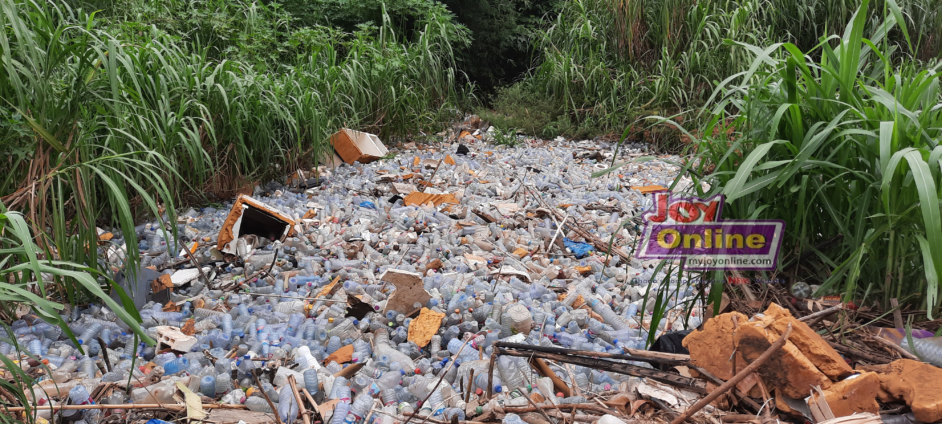
Audio By Carbonatix
The Centre for Climate Change & Food Security (CCCFS), a non-governmental organisation, is advocating the adoption of ceramic materials for domestic usage as the country fights the devastating consequences of plastic pollution.
Although peculiar to some small towns and villages in Ghana’s regions of the north, ceramics usage has not been encouraging since the introduction of plastics which have been found to be detrimental to the environment.
In a newsletter, Executive Director of CCCFS, Engr Mahmud Mohammed-Nurudeen, emphasized that reviving this practice could significantly reduce Ghana’s reliance on plastics.
“CCCFS is drawing inspiration from India's successful adoption of ceramic materials for drinking water, particularly in states like Rajasthan, emphasizing the need for a return to traditional, sustainable practices,” he said.
This comes on the heels of the celebration of Earth Day globally on the theme, “Planet vs. Plastics, highlighting the enormous negative impact single-use plastics have on our environment”.
Ghana produces around 0.84 million tons of plastic waste each year with an annual average increase of 5.4%, according to official data.
It is postulated that population growth is commensurate with plastic waste, with an annual projection of 2.2%.
The amount of plastic consumed per person is also increasing by 3.4% each year.
Despite efforts by the government, industry, and civil society, plastic waste in water bodies is expected to increase by 190% between 2020 and 2040.
The influx of plastics is posing a threat to human existence and the ecosystem including pollution of oceans and waterways, harm to marine life, and contribution to climate change.
Engr Mohammed-Nurudeen revealed the deleterious effects of the organic materials to the food chain with eventual threat to human health.
“…some of this plastic waste eventually enters the food chain, posing a significant risk to human health. When plastic debris breaks down into smaller pieces, known as microplastics, they can be ingested by small marine animals, which are then consumed by larger animals, and potentially even humans.
“This means that plastic pollution has the potential to contaminate the food we eat, leading to harmful health consequences,” he said.
CCCFS is worried many Ghanaians remain unaware of the harmful effects of plastic waste.
"The impact of plastic pollution on our environment, our health, and our economy cannot be overstated. We must take immediate action to reduce plastic waste and adopt sustainable practices. We owe it to ourselves, our children, and future generations to act now."
The centre wants drastic reductions in plastic production by petrochemical companies.
“CCCFS is calling on petrochemical companies, policymakers, and individuals to join forces in the fight against plastic pollution. Together, we can make a difference and create a cleaner, healthier, and more sustainable future for all,” Engr Mohammed-Nurudeen said.
Latest Stories
-
Ghana is rising again – Mahama declares
5 hours -
Firefighters subdue blaze at Accra’s Tudu, officials warn of busy fire season ahead
5 hours -
New Year’s Luv FM Family Party in the park ends in grand style at Rattray park
5 hours -
Mahama targets digital schools, universal healthcare, and food self-sufficiency in 2026
5 hours -
Ghana’s global image boosted by our world-acclaimed reset agenda – Mahama
6 hours -
Full text: Mahama’s New Year message to the nation
6 hours -
The foundation is laid; now we accelerate and expand in 2026 – Mahama
6 hours -
There is no NPP, CPP nor NDC Ghana, only one Ghana – Mahama
6 hours -
Eduwatch praises education financing gains but warns delays, teacher gaps could derail reforms
6 hours -
Kusaal Wikimedians take local language online in 14-day digital campaign
7 hours -
Stop interfering in each other’s roles – Bole-Bamboi MP appeals to traditional rulers for peace
7 hours -
Playback: President Mahama addresses the nation in New Year message
8 hours -
Industrial and Commercial Workers’ Union call for strong work ethics, economic participation in 2026 new year message
10 hours -
Crossover Joy: Churches in Ghana welcome 2026 with fire and faith
10 hours -
Traffic chaos on Accra–Kumasi Highway leaves hundreds stranded as diversions gridlock
10 hours

